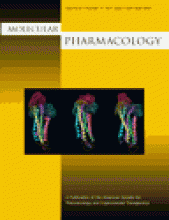In this April issue ofMolecular Pharmacology you will find the names of the new editors and editorial board members. The tradition of the ASPET journals has been to retain the names of the past editors and editorial board on the masthead until the time that the journal's contents reflected decisions made by the new board. One disadvantage to this system is that it does not allow individuals submitting papers to know who is likely to be the associate editor handling their paper and who they might expect to have as referees. As a compromise between the traditional way of doing things and what the new editors preferred, we waited until the April issue to officially change the guard. Be aware, however, that the papers in this issue, and most of those in the next two or three issues, will have been reviewed and handled by Ray Dingledine's editorial board. They are to be given both credit and liability for the contents of those issues. Manuscripts submitted as of last January came to me as editor, and my associate editors have assigned them for review. Molecular Pharmacology's practice has been to use outside reviewers as well as editorial board members, but about 40% of the reviews have been, and will continue to be, solicited from members of the board. My associate editors and I are proud to have added 19 outstanding scientists to this roster (with only a bit of arm twisting) and plan to add more in the future as submissions grow in certain areas. We hope you will take a few moments to look through the new editorial board list. We are certain that you will be impressed with the quality of the members. Please feel free to request specific editorial board members with expertise in your research area when you submit your papers to the journal.
The transition of the journal offices from Atlanta to Bethesda/La Jolla is going smoothly, and we are working hard to catch and correct any glitches that arise. There have been some delays in getting manuscripts to reviewers, and we apologize if the handling of your paper was slowed down for that reason. Please let us know if you are aware of any problems, and we will work with you to correct them and expedite further handling of your manuscript. June Dreskin is running the manuscript office in Bethesda as our managing editor. She works with manuscript assistants, Debbie Ellis and Mignone Shields. June should be able to handle most of problems you have and communicate them to me or my assistant, Shawna Adams. Shawna works in my office in La Jolla as an editorial assistant.
The first minireview of the year, which we hope attracted your attention, was published in the February issue and authored by Heather Carlson and Andy McCammon. Andy is a new member of our editorial board with extraordinary talents in the area of computer-aided molecular design. This is one of the areas in which we hope to attract more attention. Accordingly, we are working to modify the instructions to authors in order to solicit additional papers in this area. The Board of Publications Trustees is looking for ways to lower the cost to authors of publishing color figures, as has occurred with many of our competing journals. The use of color is exceedingly important in the presentation of protein structure and also critical for demonstrating cellular changes assessed by immunostaining or fluorescence. We will keep you apprised of progress in this area.
This month's issue contains the second minireview, this one in the area of signal transduction. Alex Toker has provided a timely, authoritative, and insightful review on phosphoinositide 3-kinases. This enzyme family is controlled by multiple upstream regulators and is responsible for forming products that have once again brought lipids to the attention of the cell signaling community. We are certain that this will be a highly cited and extremely useful review. Cell signaling is a major area in which we should be able to improve our share of submissions. We are committed and poised to expand. Paul Insel, Alexandra Newton, and I will be handling manuscripts in this area. We encourage submissions not only in the field of G-protein-coupled receptors but also on the regulation of kinase cascades, phospholipid signaling, and gene expression.
Thank you all for your dedication toMolecular Pharmacology.
- The American Society for Pharmacology and Experimental Therapeutics






